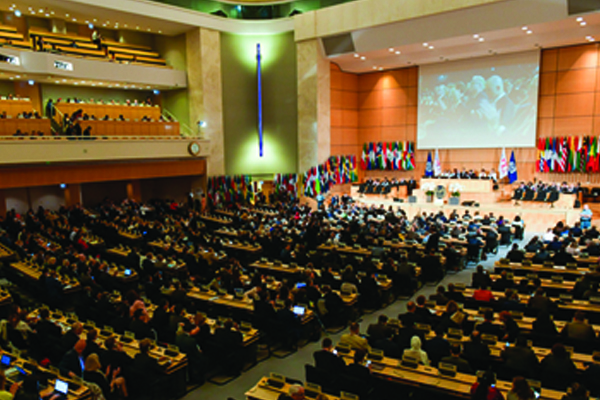|
World leaders address the Centenary International Labour Conference
World leaders gathered at the Centenary International Labour Conference (ILC) to reaffirm their commitment to the principle of social justice upon which the ILO was founded 100 years ago. The Conference, which is the 108th session of the ILC, runs from June 10 to 21. Heads of state and government and other top officials addressed the plenary on the first day of the Conference.
The President of Italy Sergio Mattarella said: “Many modern rights are rooted in the ILO’s constant commitment to the dignity of all human beings wherever they work, and whatever their occupation.”
The President of Ghana, Nana Akufo-Addo , said: “Member countries should work on the countless opportunities that lie ahead to improve the quality of working lives, close gender gaps, reverse the damage caused by global inequalities and climate change, and more importantly, also share in the discarge of the responsibility towards a more sustainable future which guarantees we leave no one behind.”
Norwegian Prime Minister Erna Solberg said: “For 100 years, the ILO has been a champion of tripartite cooperation, bringing international regulation, worker rights and equality, conditions for competition and social justice. The term ‘decent work for all was coined by the ILO’.”
The Prime Minister of Nepal, K.P. Sharma Oli , said: “Today is the time to uphold the ILO’s founding ideals and demonstrate that they continue to be relevant in forwarding the value of decent work, equality, social justice and a sustainable future.”
Also among the speakers were South African President Cyril Ramaphosa and Swedish Prime Minister Stefan Löfven , who co-chaired the Global Commission on the Future of Work . The Commission’s report, Work for a brighter future, is being debated throughout the Conference.
“It’s a double honour that I should stand here today, 25 years almost to the day when Nelson Mandela stood before this august body – that was four years before he became the democratically elected President of South Africa. The ILO, as he asked you to do, supported our struggle for the continued four years… Today I stand here again 25 years later to say thank you once again to the ILO for having supported our struggle,” said Ramaphosa.
“What we are celebrating today is really not an organization, it’s not a convention, it’s not a date. What we are celebrating is a movement. A movement forward, upwards from the misery of the First World War trenches, of factories and fields, of hunger and squalor... It’s a movement symbolized by three letters: ‘ILO’. It’s a movement now marching towards the future,” said Löfven.
The Vice-President of Turkey, Fuat Oktay , said: “The ILO’s achievements in healing wounds of two world wars, adressing social tensions generated by economic and social hardship together with stakeholders and sustaining better working conditions with the key principles of building consensus through negotiation, are the milestones in its succesful history.”
Moroccan Prime Minister Saâd-Eddine El Othmani said: “Morocco, like other countries is very concerned by these rapid changes and possible consequences on the world of work, as well as the emergence of new forms of work … it is for this reason that we welcome the focus by the ILO on this topic.”
The Vice-President of Côte d’Ivoire, Daniel Kablan Duncan said: “While there are many grounds for satisfaction, which have enabled us to give a human face to the world of work, not everything is perfect, as is the case with any human endeavours, and we must remain vigilent to maintain what has been achieved. That is why we encourage the ILO to speed up its efforts to strengthen the social contract and to promote decent and sustainable work.”
Dozens more dignitaries are scheduled to address the Centenary session of the ILC. Nearly 6,000 delegates – representing governments, workers and employers – will discuss how to address the transformative changes in the world of work, and will consider the adoption of a landmark ILO Centenary Declaration focusing on the future of work. They will also discuss violence and harassment at the workplace with a view to adopting a new international instrument.
|



